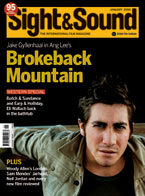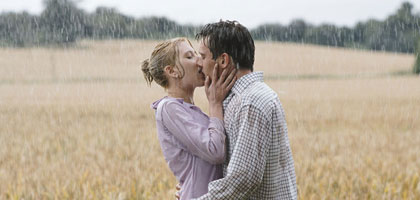Primary navigation

UK/USA/Luxemburg 2005

Reviewed by Edward Lawrenson
Our synopses give away the plot in full, including surprise twists.
London, the present. Tennis coach Chris Wilton befriends Tom Hewett, one of his students. Invited to a party at the country house of Tom's wealthy parents, Chris flirts with Nola, an American guest whom he later discovers is Tom's girlfriend. He agrees to go on a date with Tom's sister Chloe, and starts going out with her, the couple often going on joint dates with Tom and Nola. Chris accepts a job from Tom and Chloe's father and is fast-tracked for a senior position. At another Hewett party, Chris and Nola have sex, though Nola later puts an end to Chris' attempts to begin an affair.
Chris and Chloe marry, and begin trying for a baby. Hearing that Tom has dumped Nola, Chris attempts to find her but she seems to have disappeared. Some time later he bumps into her at a gallery, and the two begin an affair. When Nola falls pregnant, Chris promises to leave Chloe. Frustrated with his failure to do so, Nola threatens to tell Chloe herself. Taking a gun from the Hewetts' house, Chris kills Nola, making it appear as if she stumbled into the burglary of her next-door neighbour, whom he also shoots dead. He attempts to dump items of property taken from the neighbour so as to create the impression of a break-in, but inadvertently fails to dispose of one of her rings.
Discovering Nola's diary, which describes her affair, the police call Chris in for questioning. The lead detective correctly deduces that Chris killed Nola, but the neighbour's ring is discovered on the body of a drug dealer, who is held responsible for the murders. Chloe at last becomes pregnant. Chris seems untroubled by guilt.
Woody Allen's latest film begins with a tennis ball that glides in slow motion across a court and clips the top of the net. As it pauses, as if deciding on which side of the court to fall, the film's tennis-pro hero announces: "It's scary how much of one's life is out of control." The remark anticipates the film's meditation on both the cruel and the profitable turns of fate that beset this narrator. Following impoverished Irish-born Chris Wilton's rapid entré into the English upper classes through his marriage to Chloe Hewett, daughter of a rich industrialist, Match Point revolves around his affair with American actress Nola, and the bleak, unforeseen chaos this wreaks.
And yet, for all its concern with unruly, unmanageable emotions beneath the surface of things, the film is immediately striking for the consummate, practised control that Allen exerts over his material. There's a commanding economy to his account of Chris' acceptance into the Hewett family, which neatly conveys the young man's calculated determination to make the most of his opportunities for self-advancement. Midway through the film Chris sees Nola and her boyfriend Tom, who is Chloe's brother, tenderly make out at a party, and he realises with a poignant finality that his affair with the glamorous American is over. From this, Allen cuts directly to Chris' wedding to Chloe, then to the married couple's moving in to a flat of outrageous opulence (the penthouse view of the Thames earned a gasp of admiration from the London preview audience I attended). It's a sequence of bravura, near-wordless concision that conveys Chris' keening loss over Nola and his decision to embrace the compensatory riches the Hewetts can offer him. The transition is achieved in only three elegant cuts, an elision that starkly exposes the tenacious, insistent ambition of Chris that motivates these shifts in location.
Allen's assured touch even extends to his depiction of the English upper classes. In some senses the move suits him: in his later New York films he has seemed more at ease among the upper echelons of Manhattan's social circles than with its blue-collar residents. While Allen's preference for expansive, sumptuous domestic interiors has stretched credibility in his films about 'ordinary' New Yorkers, here it plausibly portrays the old-world splendour of the Hewett family. From the intimate, velvety darkness of a box at the Royal Opera House to a shot of the Hewetts' cavernous library of leather-bound editions, Allen's depiction of this (very English) privilege is as luxuriant and seductive as that of his fellow American James Ivory. Elsewhere he's just as sure-footed: the habit Tom has of calling Chris "Irish" picks up on a quintessentially English kind of class superiority; while the early scene of the tennis coach's dingy but pricey bedsit will convince anyone who's rented in London on a modest budget. He even manages some comedy at the expense of British cultural icons like Andrew Lloyd Webber, cutting directly from a performance of Lloyd Webber's latest show to a murder scene as if both acts were equally heinous.
There are only a few false notes. Most obvious is Chris and Nola's inaugural fuck. Acting at last on their mutual attraction, they get down to business in the grounds of the Hewett estate, falling into a field of golden wheat as a summer storm bursts above them. It's a moment of ripe cliché, a roll in the hay that owes more to Footballers' Wives than E.M. Forster. And yet this mis-step is crucial, revealing a fundamental flaw in the film. Never at ease with moments of sexual abandon - his Mighty Aphrodite (1995) co-star Helena Bonham Carter famously chided him for wearing his shoes in their scenes in bed together - Allen is either too reticent or prudish a director to convey convincingly the deep, reckless attachment between Chris and Nola. Jonathan Rhys Meyers is very good at portraying Chris' aspirant drive - he has a way of pursing his lips that suggests an attitude of sour detachment, as if sucking a distasteful boiled sweet - but his front is too aloof and inscrutable to hint at a passion that would drive him to murder. The result is that the latter stages of the film are curiously bloodless. The moral dilemmas facing Chris may owe something to Crime and Punishment, but unlike Raskolnikov, surely one of literature's most tormented figures, his stone-cold demeanour gives little away.
The plotting, too, lacks a necessary sense of tragic propulsion; it feels dutifully schematic, its ironies polite and tidy when they should be bitter and merciless. When, towards the end, Chris inadvertently fails to dispose of an incriminating piece of evidence (in a shot that recalls the film's opening moments), we're past caring: the moment of tragic reversal is played as a twist-in-the-tale gag.
In such moments you long for the savage, misanthropic humour of Deconstructing Harry (1997), in which the laughs come from material that is far more tough and emotionally raw - and which is arguably closer to a tragic sensibility than the Dostoyevsky-lite we get here. The other reason why the film's second half disappoints is that it must deal with the departure of Scarlett Johansson. Bringing to the part of Nola a mix of playful allure, piercing vulnerability and bolshie resolve, she is the film's most compelling, vivid presence. Like Samantha Morton in Sweet and Lowdown (1999), she makes all of her scenes her own. When she's on screen you can feel the film break free from the exacting, slightly stifling control that Allen exerts elsewhere - and the movie is all the richer for it.